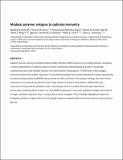| dc.contributor.author | Bennett, Nitasha R | |
| dc.contributor.author | Jarvis, Cassie Marie. | |
| dc.contributor.author | Alam, Mohammad Murshid | |
| dc.contributor.author | Zwick, Daniel B | |
| dc.contributor.author | Olson, Jake M | |
| dc.contributor.author | Nguyen, Hung V.-T. | |
| dc.contributor.author | Johnson, Jeremiah A. | |
| dc.contributor.author | Cook, Mark E | |
| dc.contributor.author | Kiessling, Laura L | |
| dc.date.accessioned | 2021-01-19T20:19:32Z | |
| dc.date.available | 2021-01-19T20:19:32Z | |
| dc.date.issued | 2019-10 | |
| dc.identifier.issn | 1525-7797 | |
| dc.identifier.issn | 1526-4602 | |
| dc.identifier.uri | https://hdl.handle.net/1721.1/129449 | |
| dc.description.abstract | Subunit vaccines can have excellent safety profiles, but their ability to give rise to robust immune responses is often compromised. For glycan-based vaccines, insufficient understanding of B and T cell epitope combinations that yield optimal immune activation hinders optimization. To determine which antigen features promote desired IgG responses, we synthesized epitope-functionalized polymers using ring-opening metathesis polymerization (ROMP) and assessed the effect of B and T cell epitope loading. The most robust responses were induced by polymers with a high valency of B and T cell epitopes. Additionally, IgG responses were greater for polymers with T cell epitopes that are readily liberated upon endosomal processing. Combining these criteria, we used ROMP to generate a nontoxic, polymeric antigen that elicited stronger antibody responses than a comparable protein conjugate. These findings highlight principles for designing synthetic antigens that elicit strong IgG responses against inherently weak immune targets such as glycans. | en_US |
| dc.description.sponsorship | National Institutes of Health (AI055258) | en_US |
| dc.language.iso | en | |
| dc.publisher | American Chemical Society (ACS) | en_US |
| dc.relation.isversionof | 10.1021/ACS.BIOMAC.9B01049 | en_US |
| dc.rights | Article is made available in accordance with the publisher's policy and may be subject to US copyright law. Please refer to the publisher's site for terms of use. | en_US |
| dc.source | Prof. Kiessling via Ye Li | en_US |
| dc.title | Modular polymer antigens to optimize immunity | en_US |
| dc.type | Article | en_US |
| dc.identifier.citation | Bennett, Nitasha R. et al. "Modular polymer antigens to optimize immunity." Biomacromolecules 20, 12 (October 2019): 4370-79 ©2019 American Chemical Society | en_US |
| dc.contributor.department | Massachusetts Institute of Technology. Department of Chemistry | en_US |
| dc.contributor.department | Koch Institute for Integrative Cancer Research at MIT | en_US |
| dc.relation.journal | Biomacromolecules | en_US |
| dc.eprint.version | Author's final manuscript | en_US |
| dc.type.uri | http://purl.org/eprint/type/JournalArticle | en_US |
| eprint.status | http://purl.org/eprint/status/PeerReviewed | en_US |
| dc.date.updated | 2020-10-14T16:28:39Z | |
| dspace.date.submission | 2020-10-14T16:28:51Z | |
| mit.journal.volume | 20 | en_US |
| mit.journal.issue | 12 | en_US |
| mit.license | PUBLISHER_POLICY | |
| mit.metadata.status | Complete | |

